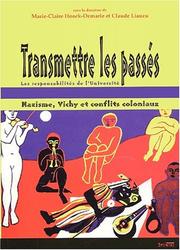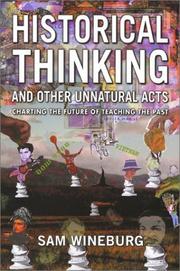| Listing 1 - 2 of 2 |
Sort by
|

ISBN: 2913165532 9782913165533 Year: 2001 Publisher: Paris: Syllepse,
Abstract | Keywords | Export | Availability | Bookmark
 Loading...
Loading...Choose an application
- Reference Manager
- EndNote
- RefWorks (Direct export to RefWorks)
L'Université est trop souvent bousculée par les assauts d'idéologies se réclamant de la race, de la purification ethnique et de conceptions inégalitaires des sociétés. Le milieu scientifique est aussi agité périodiquement par des scandales, des polémiques, des affaires qu'on ne saurait résumer aux élucubrations d'individus ou de minorités. Exorciser les faits en les rejetant dans un passé désormais révolu ou prononcer des condamnations éthiques ne permet pas de répondre à ces dangers. Une des responsabilités scientifiques et civiques de l'Université et du système éducatif tout entier est d'assumer l'héritage contrasté de notre modernité par la recherche de la vérité, l'analyse critique des rapports entre savoirs et dominations, la diffusion de la connaissance. À l'occasion de son trentième anniversaire, l'université Paris 7-Denis Diderot a tenté de répondre à ces défis en affirmant certains de ses traits originaux: une interdisciplinarité associant en particulier sciences humaines et sciences biologiques, une attention égale à l'histoire des sociétés occidentales et à celle des autres sociétés, une réflexion sur les contenus des savoirs et sur leurs fonctions sociales. Issu de ces exigences, c'est à un questionnement vigilant que cet ouvrage se livre, autour de quatre grands axes: les " sciences de gouvernement ", l'eugénisme et le " darwinisme social ", la mémoire de certains passés (négationnisme, Vichy, histoire du colonialisme) et la transmission des savoirs
Historiography --- College teaching --- History --- Historiographie --- Enseignement universitaire --- Histoire --- Congresses --- Study and teaching --- Congrès --- Etude et enseignement --- Study and teaching (Higher) --- France --- Congrès --- Congresses. --- History - Study and teaching (Higher) --- France - History - Study and teaching (Higher) --- Ideologie et historiographie --- Memoire collective --- Sciences --- Eugenisme --- Aspect moral --- Congres --- Aspect politique

ISBN: 9781566398565 1566398568 156639855X Year: 2001 Publisher: Philadelphia: Temple university press,
Abstract | Keywords | Export | Availability | Bookmark
 Loading...
Loading...Choose an application
- Reference Manager
- EndNote
- RefWorks (Direct export to RefWorks)
Since ancient times, the pundits have lamented young people's lack of historical knowledge and warned that ignorance of the past surely condemns humanity to repeating its mistakes. In the contemporary United States, this dire outlook drives a contentious debate about what key events, nations, and people are essential for history students. Sam Wineburg says that we are asking the wrong questions. This book demolishes the conventional notion that there is one true history and one best way to teach it. Although most of us think of history - and learn it - as a conglomeration of facts, dates, and key figures, for professional historians it is a way of knowing, a method for developing an understanding about the relationships of peoples and events in the past. A cognitive psychologist, Wineburg has been engaged in studying what is intrinsic to historical thinking, how it might be taught, and why most students still adhere to the "one damned thing after another" concept of history. Whether he is comparing how students and historians interpret documentary evidence or analyzing children's drawings, Wineburg's essays offer "rough maps of how ordinary people think about the past and use it to understand the present." Arguing that we all absorb lessons about history in many settings - in kitchen table conversations, at the movies, or on the world-wide web, for instance - these essays acknowledge the role of collective memory in filtering what we learn in school and shaping our historical thinkingBron: http://tupress.temple.edu/book/3231
History --- Historiography --- Study and teaching --- Philosophy --- Historiography. --- Culture conflict --- Histoire --- Historiographie --- Conflit culturel --- Etude et enseignement --- United States --- Etats-Unis --- Study and teaching. --- Geschiedenis --- Historisch denken --- Historische kritiek --- Onderwijs --- Didactiek --- Geneeskunde --- Techniek (wetenschap) --- Atlas --- Museum --- Opvoeding --- Pedagogiek --- Statistische gegevens --- Sport --- History - Study and teaching - Philosophy --- Annals --- Auxiliary sciences of history --- Historical criticism --- Authorship --- Criticism --- Historiographie. --- Philosophy. --- Étude et enseignement --- Philosophie. --- États-Unis --- Étude et enseignement. --- Études américaines --- Étude et enseignement --- Philosophie
| Listing 1 - 2 of 2 |
Sort by
|

 Search
Search Feedback
Feedback About UniCat
About UniCat  Help
Help News
News